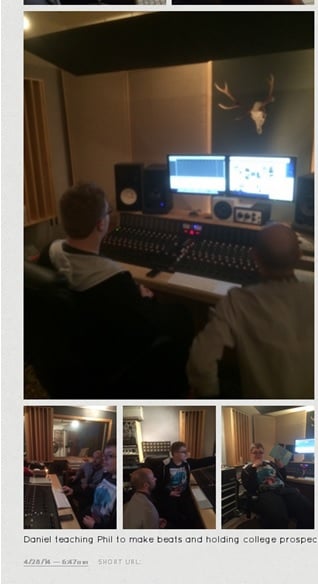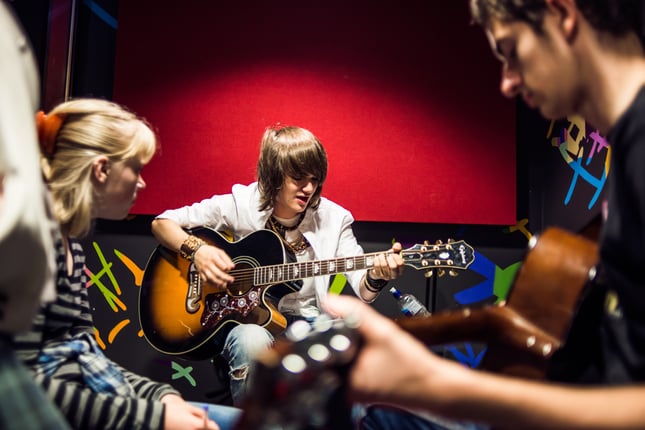
5 things to say to your SLT about the value of the arts
BY: Annabel Thomas
03 May 2019
We think the arts are vitally important. If you’re reading this blog we reckon you probably agree. However it is rarely easy to convince senior leaders to invest your time and your organisations’ money into something which is no longer seen as a ‘core’ offer. With the EBacc and increased pressure on school leadership teams to deliver quantitative results, subjects which are not part of the EBacc have suffered (unfortunately all arts subjects fall into this bucket) – both in terms of investment in resources but also in terms of teaching time.
So how can you capture the imagination of your senior leaders to impress upon them the value of the arts? Read on for our five top arguments:
1. Preparing students for the future
The jobs which young people are studying for today haven’t even been invented yet. Increasingly valued are adaptable skill sets such as effective communication, teamwork and creativity. The recent NESTA report highlighted that increasingly skills that will be in-demand are interpersonal skills and higher level critical thinking – areas which the arts can reach. And indeed, arts jobs are less likely to suffer from automation in the future. By studying the arts students are helping to future-proof themselves against the unknown changes we are likely to see in our society in the coming decades.
The arts also enable students to think outside the box, and to develop their sense of problem solving in a creative way. The arts provide the space for young people to try something, to fail, and to try again in a supportive environment. And this doesn’t just relate to traditional creative jobs – engineering, architecture, law – these all require finessing of detail and expertise, something which the arts can help to develop.
2. Wellbeing
Wellbeing and improving young people’s mental health is at the forefront of many teachers and leadership team’s minds currently. Young people are suffering in greater numbers, and there is increasingly less support available to them if they do end up in crisis. The excellent briefing from the Cultural Learning Alliance explores why and how the arts can make us happier, and there is a growing body of research demonstrating just this. That the NHS is thinking about prescribing arts activities as part of their social prescribing programme speaks volume to the wide ranging, and whole-school benefits that having a strong arts offer in a school can offer. We’ve written a whole blog on this topic, and suggest you have a read for lots more stats and information to help back up your conversations with colleagues and senior leaders.
3. Retention
Something which is increasingly becoming a higher priority for schools – especially those with sixth form provision – is how to retain your students. There are lots of options for young people to choose from after their GCSEs and often competition between options. Having a great offer post-16 which goes above and beyond the core curriculum is vital to ensuring retention of students. Offering something like Arts Award in your sixth form could be the hook which keeps students with you, especially if they know there are great opportunities for leadership and skills development which they otherwise wouldn’t be able to access.
For ambitious students this is an excellent opportunity to include in their application for universities, especially if they are looking to study overseas. It shows commitment to their learning, but also demonstrates that they are rounded young people with a range of experiences to bring to any institution.
For other students being able to take part in a school production, choir, orchestra or art club could be a really important factor in them deciding to stay at your school. Schools have always been about far more than exam results, and having a strong arts offer demonstrates this to the students, parents and local community.
4. Transferable skills – metacognition and supporting other subjects
We’ve already touched on this, but the arts help to develop transferrable skills like no other subject. Confidence, teamwork, resilience and more are all developed by the arts. This is always hard to measure, but if schools are committed to preparing students for their future the arts should be a key component of any curriculum. We’ve written about the importance of metacognition in the past, and how Arts Award helps develop this. Learning to learn and reflective learning practices will serve students well in all subjects, at university and beyond.
5. Fly the flag for your school
When you go onto any school website or look at a school brochure the thing which always jumps out at you are the arts – students playing musical instruments, performing in school productions or painting incredible works of art. This is what sells your school to potential students and their parents. If it is at the forefront of a schools’ marketing, why isn’t it at the core of the school? Parents are increasingly looking for schools who offer this range of experience for their children. All schools can offer the same curriculum, but how many can have orchestras, choirs, drama clubs, art clubs, textiles, sculpture… This is what will set your school apart!
These are five of our top talking points. We have many more along with further information about making the case for Arts Award in our Value and Positioning resource. And if your particular specialism is visual art, take a look at our new guide to getting visual art recognised at your school. This guide is packed with evidence that will help you to advocate for the arts, not only to your senior team but also to parents and students .
We want to support you to champion the arts in your school! Share with us any success stories you have in the comments below!
Related posts
BY: Guest Writer





Comments & Replies